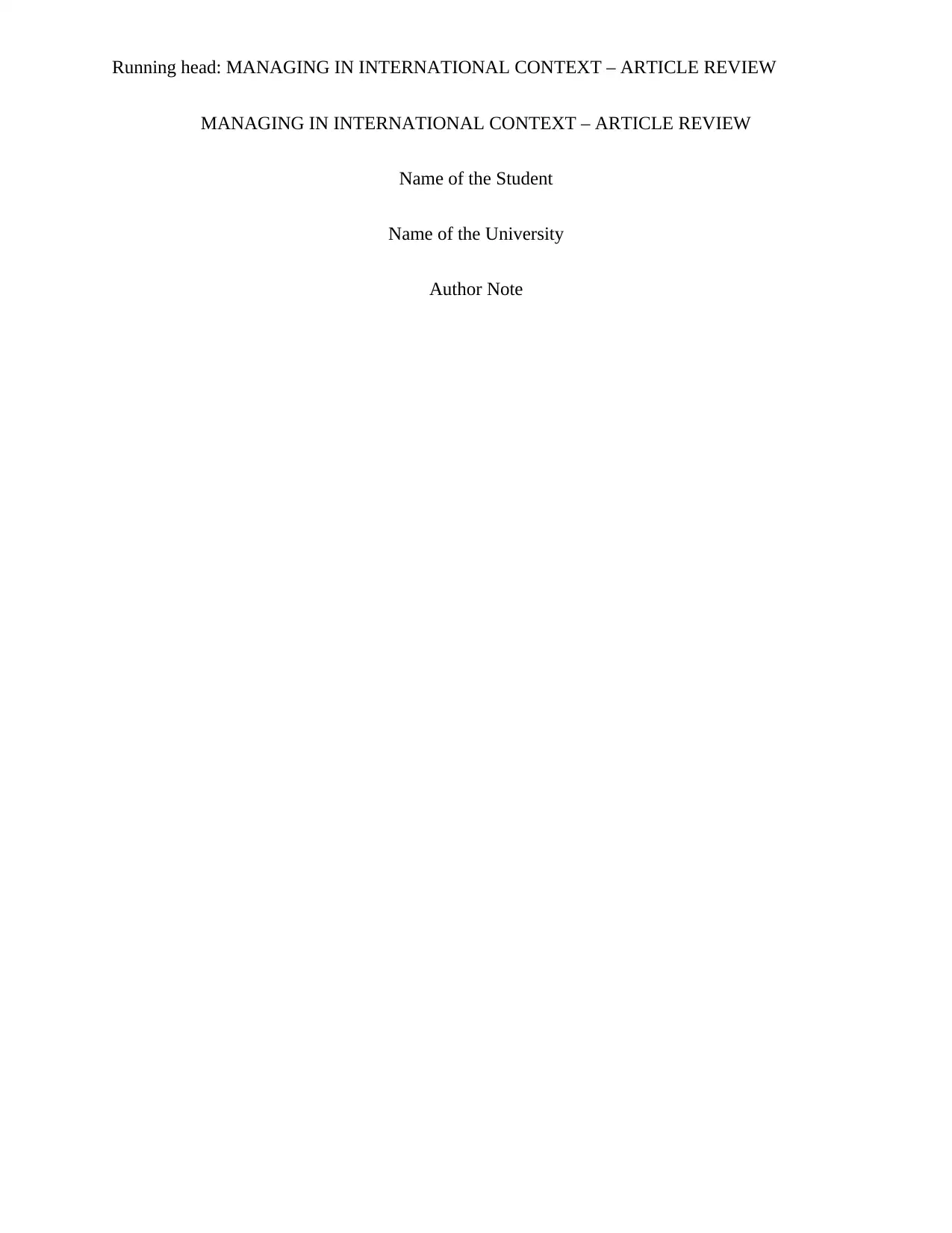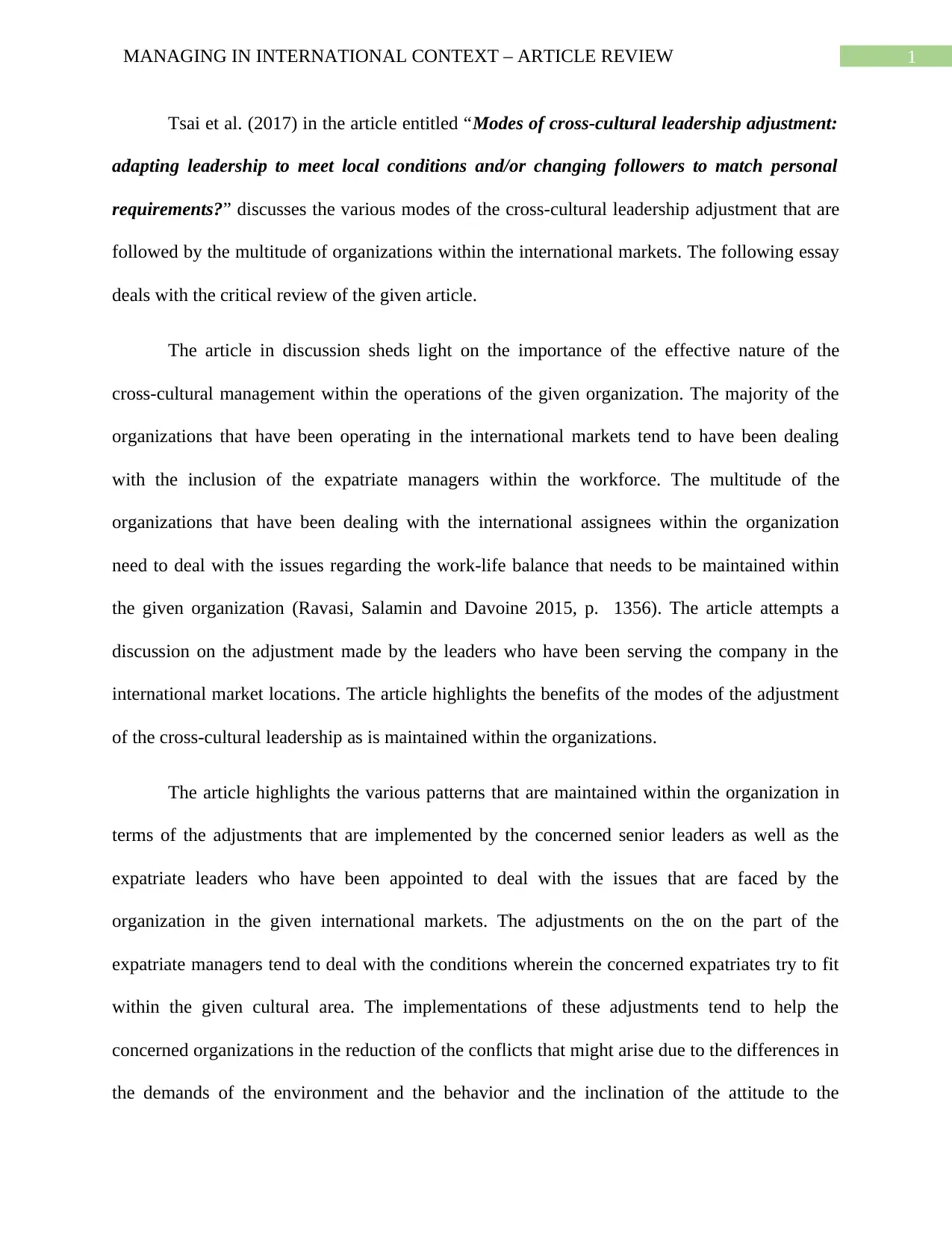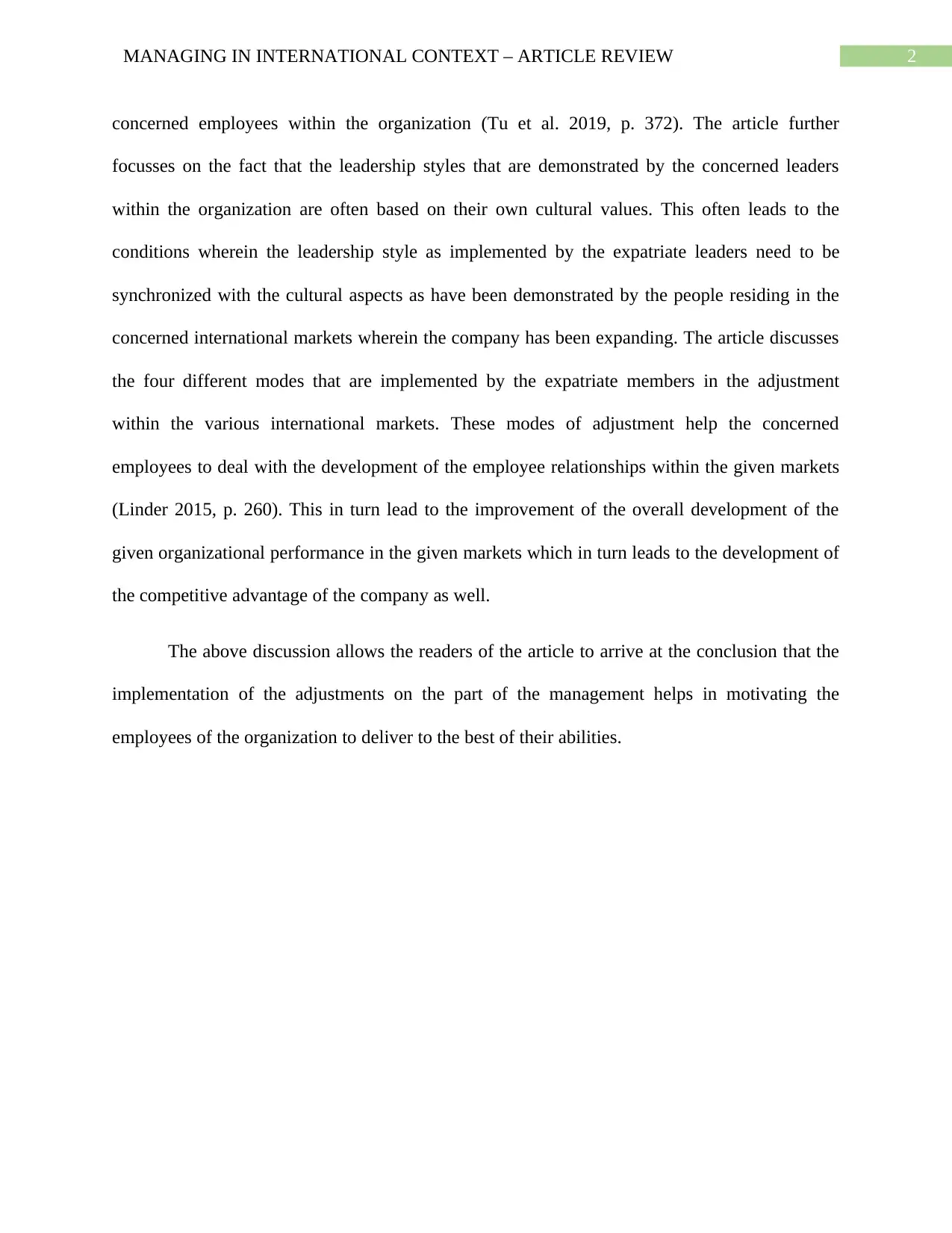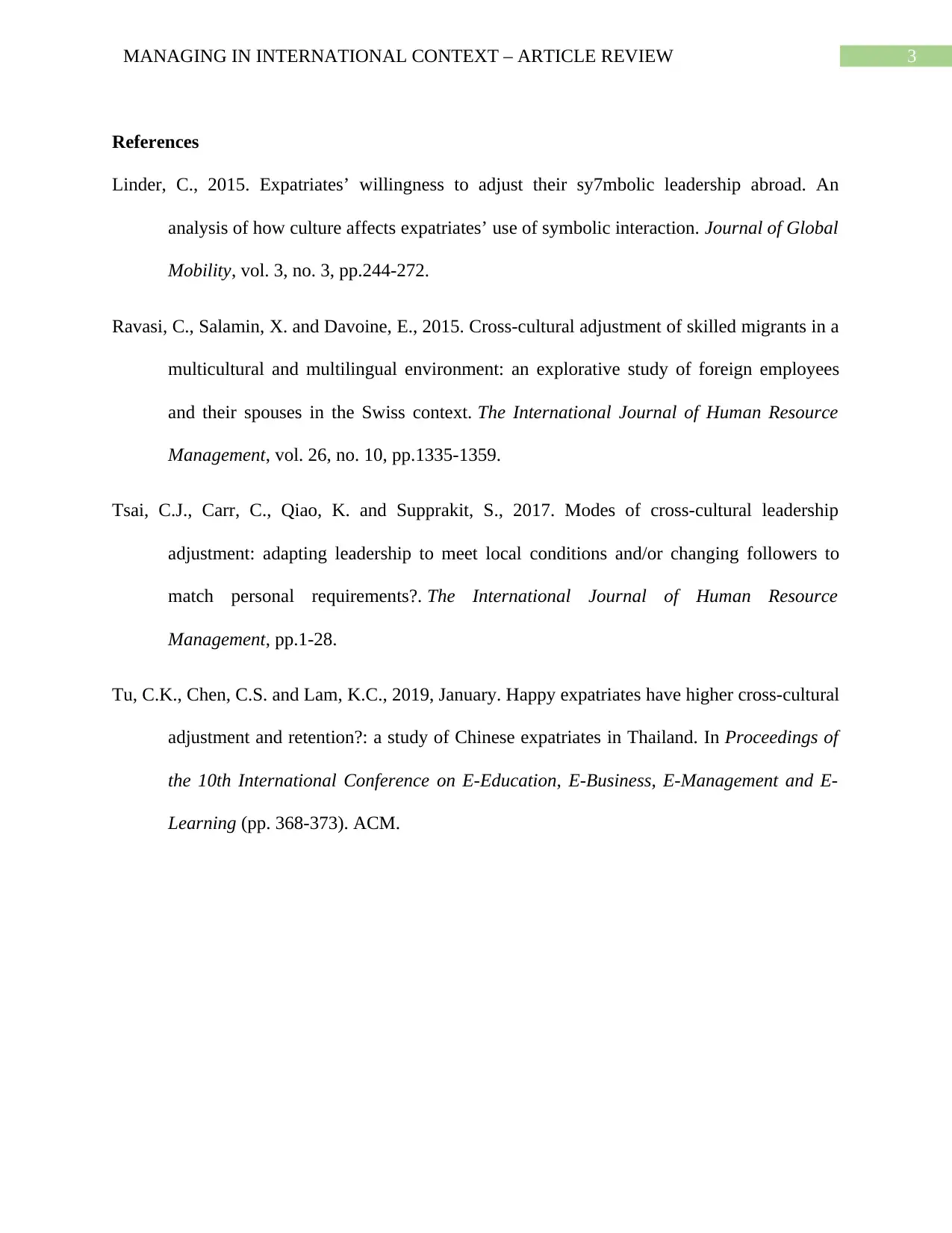Article Review: Modes of Cross-Cultural Leadership Adjustment
VerifiedAdded on 2023/01/19
|4
|821
|31
Report
AI Summary
This report provides a critical review of the article "Modes of cross-cultural leadership adjustment: adapting leadership to meet local conditions and/or changing followers to match personal requirements?" by Tsai et al. (2017). The review explores the importance of effective cross-cultural management, particularly concerning expatriate managers in international markets. The article discusses various adjustment modes implemented by leaders to navigate cultural differences and improve organizational performance. It highlights how leadership styles are often rooted in cultural values, necessitating synchronization with local contexts. The review focuses on four adjustment modes that help develop employee relationships and enhance competitive advantage. The conclusion emphasizes the role of management adjustments in motivating employees to perform optimally.

Running head: MANAGING IN INTERNATIONAL CONTEXT – ARTICLE REVIEW
MANAGING IN INTERNATIONAL CONTEXT – ARTICLE REVIEW
Name of the Student
Name of the University
Author Note
MANAGING IN INTERNATIONAL CONTEXT – ARTICLE REVIEW
Name of the Student
Name of the University
Author Note
Paraphrase This Document
Need a fresh take? Get an instant paraphrase of this document with our AI Paraphraser

1MANAGING IN INTERNATIONAL CONTEXT – ARTICLE REVIEW
Tsai et al. (2017) in the article entitled “Modes of cross-cultural leadership adjustment:
adapting leadership to meet local conditions and/or changing followers to match personal
requirements?” discusses the various modes of the cross-cultural leadership adjustment that are
followed by the multitude of organizations within the international markets. The following essay
deals with the critical review of the given article.
The article in discussion sheds light on the importance of the effective nature of the
cross-cultural management within the operations of the given organization. The majority of the
organizations that have been operating in the international markets tend to have been dealing
with the inclusion of the expatriate managers within the workforce. The multitude of the
organizations that have been dealing with the international assignees within the organization
need to deal with the issues regarding the work-life balance that needs to be maintained within
the given organization (Ravasi, Salamin and Davoine 2015, p. 1356). The article attempts a
discussion on the adjustment made by the leaders who have been serving the company in the
international market locations. The article highlights the benefits of the modes of the adjustment
of the cross-cultural leadership as is maintained within the organizations.
The article highlights the various patterns that are maintained within the organization in
terms of the adjustments that are implemented by the concerned senior leaders as well as the
expatriate leaders who have been appointed to deal with the issues that are faced by the
organization in the given international markets. The adjustments on the on the part of the
expatriate managers tend to deal with the conditions wherein the concerned expatriates try to fit
within the given cultural area. The implementations of these adjustments tend to help the
concerned organizations in the reduction of the conflicts that might arise due to the differences in
the demands of the environment and the behavior and the inclination of the attitude to the
Tsai et al. (2017) in the article entitled “Modes of cross-cultural leadership adjustment:
adapting leadership to meet local conditions and/or changing followers to match personal
requirements?” discusses the various modes of the cross-cultural leadership adjustment that are
followed by the multitude of organizations within the international markets. The following essay
deals with the critical review of the given article.
The article in discussion sheds light on the importance of the effective nature of the
cross-cultural management within the operations of the given organization. The majority of the
organizations that have been operating in the international markets tend to have been dealing
with the inclusion of the expatriate managers within the workforce. The multitude of the
organizations that have been dealing with the international assignees within the organization
need to deal with the issues regarding the work-life balance that needs to be maintained within
the given organization (Ravasi, Salamin and Davoine 2015, p. 1356). The article attempts a
discussion on the adjustment made by the leaders who have been serving the company in the
international market locations. The article highlights the benefits of the modes of the adjustment
of the cross-cultural leadership as is maintained within the organizations.
The article highlights the various patterns that are maintained within the organization in
terms of the adjustments that are implemented by the concerned senior leaders as well as the
expatriate leaders who have been appointed to deal with the issues that are faced by the
organization in the given international markets. The adjustments on the on the part of the
expatriate managers tend to deal with the conditions wherein the concerned expatriates try to fit
within the given cultural area. The implementations of these adjustments tend to help the
concerned organizations in the reduction of the conflicts that might arise due to the differences in
the demands of the environment and the behavior and the inclination of the attitude to the

2MANAGING IN INTERNATIONAL CONTEXT – ARTICLE REVIEW
concerned employees within the organization (Tu et al. 2019, p. 372). The article further
focusses on the fact that the leadership styles that are demonstrated by the concerned leaders
within the organization are often based on their own cultural values. This often leads to the
conditions wherein the leadership style as implemented by the expatriate leaders need to be
synchronized with the cultural aspects as have been demonstrated by the people residing in the
concerned international markets wherein the company has been expanding. The article discusses
the four different modes that are implemented by the expatriate members in the adjustment
within the various international markets. These modes of adjustment help the concerned
employees to deal with the development of the employee relationships within the given markets
(Linder 2015, p. 260). This in turn lead to the improvement of the overall development of the
given organizational performance in the given markets which in turn leads to the development of
the competitive advantage of the company as well.
The above discussion allows the readers of the article to arrive at the conclusion that the
implementation of the adjustments on the part of the management helps in motivating the
employees of the organization to deliver to the best of their abilities.
concerned employees within the organization (Tu et al. 2019, p. 372). The article further
focusses on the fact that the leadership styles that are demonstrated by the concerned leaders
within the organization are often based on their own cultural values. This often leads to the
conditions wherein the leadership style as implemented by the expatriate leaders need to be
synchronized with the cultural aspects as have been demonstrated by the people residing in the
concerned international markets wherein the company has been expanding. The article discusses
the four different modes that are implemented by the expatriate members in the adjustment
within the various international markets. These modes of adjustment help the concerned
employees to deal with the development of the employee relationships within the given markets
(Linder 2015, p. 260). This in turn lead to the improvement of the overall development of the
given organizational performance in the given markets which in turn leads to the development of
the competitive advantage of the company as well.
The above discussion allows the readers of the article to arrive at the conclusion that the
implementation of the adjustments on the part of the management helps in motivating the
employees of the organization to deliver to the best of their abilities.
⊘ This is a preview!⊘
Do you want full access?
Subscribe today to unlock all pages.

Trusted by 1+ million students worldwide

3MANAGING IN INTERNATIONAL CONTEXT – ARTICLE REVIEW
References
Linder, C., 2015. Expatriates’ willingness to adjust their sy7mbolic leadership abroad. An
analysis of how culture affects expatriates’ use of symbolic interaction. Journal of Global
Mobility, vol. 3, no. 3, pp.244-272.
Ravasi, C., Salamin, X. and Davoine, E., 2015. Cross-cultural adjustment of skilled migrants in a
multicultural and multilingual environment: an explorative study of foreign employees
and their spouses in the Swiss context. The International Journal of Human Resource
Management, vol. 26, no. 10, pp.1335-1359.
Tsai, C.J., Carr, C., Qiao, K. and Supprakit, S., 2017. Modes of cross-cultural leadership
adjustment: adapting leadership to meet local conditions and/or changing followers to
match personal requirements?. The International Journal of Human Resource
Management, pp.1-28.
Tu, C.K., Chen, C.S. and Lam, K.C., 2019, January. Happy expatriates have higher cross-cultural
adjustment and retention?: a study of Chinese expatriates in Thailand. In Proceedings of
the 10th International Conference on E-Education, E-Business, E-Management and E-
Learning (pp. 368-373). ACM.
References
Linder, C., 2015. Expatriates’ willingness to adjust their sy7mbolic leadership abroad. An
analysis of how culture affects expatriates’ use of symbolic interaction. Journal of Global
Mobility, vol. 3, no. 3, pp.244-272.
Ravasi, C., Salamin, X. and Davoine, E., 2015. Cross-cultural adjustment of skilled migrants in a
multicultural and multilingual environment: an explorative study of foreign employees
and their spouses in the Swiss context. The International Journal of Human Resource
Management, vol. 26, no. 10, pp.1335-1359.
Tsai, C.J., Carr, C., Qiao, K. and Supprakit, S., 2017. Modes of cross-cultural leadership
adjustment: adapting leadership to meet local conditions and/or changing followers to
match personal requirements?. The International Journal of Human Resource
Management, pp.1-28.
Tu, C.K., Chen, C.S. and Lam, K.C., 2019, January. Happy expatriates have higher cross-cultural
adjustment and retention?: a study of Chinese expatriates in Thailand. In Proceedings of
the 10th International Conference on E-Education, E-Business, E-Management and E-
Learning (pp. 368-373). ACM.
1 out of 4
Related Documents
Your All-in-One AI-Powered Toolkit for Academic Success.
+13062052269
info@desklib.com
Available 24*7 on WhatsApp / Email
![[object Object]](/_next/static/media/star-bottom.7253800d.svg)
Unlock your academic potential
Copyright © 2020–2026 A2Z Services. All Rights Reserved. Developed and managed by ZUCOL.





